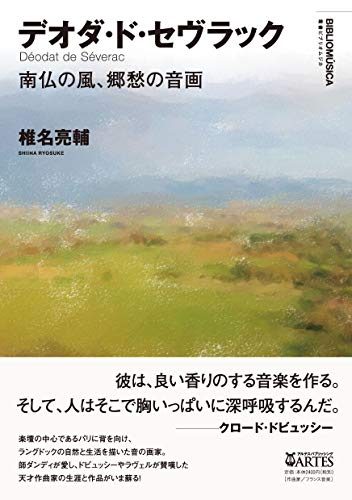3 0 0 0 IR ジョン・ケージと禅--その再検討
- 著者
- 椎名 亮輔
- 出版者
- 京都
- 雑誌
- 同志社女子大学学術研究年報 (ISSN:04180038)
- 巻号頁・発行日
- vol.54, no.1, pp.107-121, 2003-12
2 0 0 0 IR モンポウ/ブランカフォルト往復書筒(1921年7月~1924年7月) : 解題と翻訳
- 著者
- モンポウ フラダリック ブランカフォルト マヌエル 椎名 亮輔
- 出版者
- 京田辺
- 雑誌
- 同志社女子大学学術研究年報 (ISSN:04180038)
- 巻号頁・発行日
- no.66, pp.139-168, 2015
研究ノート
2 0 0 0 IR モンポウ/ブランカフォルト往復書簡(1924年8月~1925年3月) : 解題と翻訳
- 著者
- モンポウ フラダリック ブランカフォルト マヌエル 椎名 亮輔
- 出版者
- 京都
- 雑誌
- 同志社女子大学大学院文学研究科紀要 = Papers in Language, Literature, and Culture of the Graduate School of Doshisha Women's College of Liberal Arts (ISSN:18849296)
- 巻号頁・発行日
- no.16, pp.39-84, 2016-03
現代カタルーニャを代表する作曲家、フラダリック・モンポウ(1893~1987)とマヌエル・ブランカフォルト(1897~1987)の青年時代の往復書簡を紹介する。1918 年から1921 年6 月までの分は『同志社女子大学総合文化研究所紀要』第32 巻(2015 年)に、また1921 年7 月から1924 年7 月までの分は『同志社女子大学学術研究年報』第66 巻(2015 年)に掲載されている。 1924 年から1925 年にかけて、モンポウは31 歳から32 歳、ブランカフォルトは4歳年下だから27 歳から28 歳である。すでにモンポウの作品は、1921 年にパリで演奏され評価されていたが、ブランカフォルトは生まれ故郷のバルセロナ北郊の温泉地ラ・ガリーガで、父から任されているロール・ピアノ工場を切り盛りして行かなければならず、自由にバルセロナに「下りて」行くこともかなわないのだった。 モンポウは前年から続いている、パリ在住のスペイン人既婚夫人マリアとの恋愛関係に悩んでいる。しかしまた、留守がちなマリアの夫の不動産業の手伝いをしたり、子どもたちの面倒を見たり、それなりに家庭的な幸福を味わってもいる。またこのころに、バルセロナの友人、アウゼビ・カルニセロEusebi Carnicero と一緒にフランスのアイスクリームをバルセロナで売るという事業を思い付いて、実行に移そうとする。 一方、ブランカフォルトは、彼の名を国際的に広めた〈軽業師のポルカPolka de l'equilibrista〉を含む曲集《遊園地El parc d'atraccions》を作曲している。ブランカフォルト財団ほかの年譜では、この曲集は、1924 年にリカルド・ビニェスRicardo Viñes(カタルーニャ語ではRicard Viñes)によってパリで初演された、とされる(http : //www.manuelblancafort.org/esp/biografia/ など)が、ブランカフォルトの1924 年11 月13 日の書簡54 によれば、この時点で彼はまだこの曲集を書き上げていない。2007 年にバルセロナでビニェスについての大規模な展覧会が催されたが、そのときのカタログの年譜の部分を見てみると、ブランカフォルトのこの作品(同時にモンポウの《魅惑Charmes》も)がビニェスの手によってパリで初演されたのは、1926 年となっている(Ricard Viñes : El pianista de les avantguardes, Fundació Caixa Catalunya,Barcelona, 2007, p.243.)。そして、ビニェスによる録音は、1929 年11 月4 日パリのコロンビア社のスタジオで行われている(同時に、曲集第1 曲の〈騎馬パレードのオルガンL'orgue dels cavallets〉も録音されている)(Mildred Clary, Ricardo Viñes : Un pèlerin de l'Absolu, Actes Sud, Arles, 2011, p.294.)。
1 0 0 0 IR モンポウ/ブランカフォルト往復書簡(1926年4月) : 解題と翻訳
- 著者
- モンポウ フラダリック ブランカフォルト マヌエル 椎名 亮輔
- 出版者
- 京都
- 雑誌
- 同志社女子大学大学院文学研究科紀要 = Papers in Language, Literature, and Culture of the Graduate School of Doshisha Women's College of Liberal Arts (ISSN:18849296)
- 巻号頁・発行日
- no.17, pp.1-33, 2017-03
- 著者
- 椎名 亮輔
- 出版者
- 日本比較文学会
- 雑誌
- 比較文学 (ISSN:04408039)
- 巻号頁・発行日
- vol.50, pp.139-142, 2008
1 0 0 0 OA モダニズムの矛盾:作曲家、松平頼則の場合
- 著者
- 椎名 亮輔
- 出版者
- 国際日本文化研究センター
- 雑誌
- 日本研究・京都会議 KYOTO CONFERENCE ON JAPANESE STUDIES 1994 Ⅲ = KYOTO CONFERENCE ON JAPANESE STUDIES 1994 III (ISSN:09152822)
- 巻号頁・発行日
- vol..non01-03, pp.228-232, 1996-03-25
1 0 0 0 IR デオダ・ド・セヴラックの論文「中央集権と音楽の党派性」解題と翻訳
- 著者
- Severac Deodat de 椎名 亮輔
- 出版者
- 京都
- 雑誌
- 同志社女子大学学術研究年報 (ISSN:04180038)
- 巻号頁・発行日
- no.60, pp.91-105, 2009
研究資料 (Material)
1 0 0 0 デオダ・ド・セヴラック : 南仏の風、郷愁の音画
- 著者
- 椎名亮輔著
- 出版者
- アルテスパブリッシング
- 巻号頁・発行日
- 2011
1 0 0 0 OA ナティエの音楽記号学をめぐって
- 著者
- 椎名 亮輔
- 出版者
- 東京大学比較文学・文化研究会
- 雑誌
- 比較文学・文化論集 (ISSN:0911341X)
- 巻号頁・発行日
- vol.8, pp.16-20, 1991-06-10
1 0 0 0 OA 極低温共鳴X線回折による多重極子複合自由度の観測
強相関電子系物質におけるスピン・軌道の複合自由度が低温で示す様々な新奇秩序現象を研究する上で極めて強力な実験手法である共鳴X線回折実験を,最低温度0. 6 K,磁場8Tの環境で行うことができるシステムをSpring-8の日本原子力機構ビームラインBL22XUに構築した.典型3物質Ce0. 7La0. 3B6, PrPd3S4, DyPd3S4について実験を行い,いずれもf電子の多極子自由度が密接に関与した秩序を形成していることを観測した.
1 0 0 0 OA <論文>リュック・フェラーリ, あるいは非<音楽>としての記憶
- 著者
- 椎名 亮輔
- 出版者
- 同志社女子大学
- 雑誌
- 総合文化研究所紀要 (ISSN:09100105)
- 巻号頁・発行日
- vol.19, pp.93-107, 2002-03-31
The strategy of Luc Ferrari (1929 -), a French contemporary composer, in bewildering his listeners, consists among other things, of scattering autobiographical references in his work. As Philippe Lejeune points out, in reading an autobiography we must make contract with the author : we must acknowledge that the author really exists, and that it was he who realized these texts. Here we encounter the reality that extends behind the artistic work itself. With Ferrari, through his autobiography, we are led to an extra-musical world. His interest in the extra-musical world had already begun with his early "concrete" works in the 50's. The "musique concrete" is constructed with sound material from the real environment, material that the composer records, manipulates and fixes directly on disk or tape. Although manipulated in this way, the sounds keep their original character : the listeners easily understand which sounds he uses, so that the sounds do not remain a merely physically but are carriers of some meaning. Ferrari takes advantage of the variety of meanings, carried in this way by the auto-biographical, or the "concrete" character of the sounds. But this is not all : our tendency to listen to music as absolute music - to listen only to the sounds without reading the literal explanation in the case of lieder, operas or program music - is of no use, because our attention is immediately disturbed by the pornographic photos on the jacket of his LP disk, Cellule 75,for example. If Mikel Dufrenne is right saying that before the appiarance of writing the arts had their origin in the memory, and that the mother of arts is at the same time the goddess of memory (Mnemosyne, mother of Muses), the position of Ferrari is very significant because he continuously tries to bring the maximum of the senses to the sound works, despising the written level : surcharging the meaning of sounds, written texts, photos, films, radio dramas, installations... as if he returned to the origin of the music, memory. As for memory, according to the research of Paul Ricoeur, the Greeks distinguished two kinds : mneme, simple remembering, and anamnesis, recollection, i. e. spiritual movement for recollecting. The Greeks were conscious of the fact that it is us who make the memory, not the memory which returns to us, a fact on which, in the domain of neuro-psychology, Israel Rosenfield is insisting today. And in the artistic domain, we can say that there are authors who create so to say "new memory" for us, who appreciate it and experience it as if we lived this memory, as "our" autobiography. Among others it is Luc Ferrari and his music which bring us this kind of artistic experience, out of the traditional esthetic criteria.

